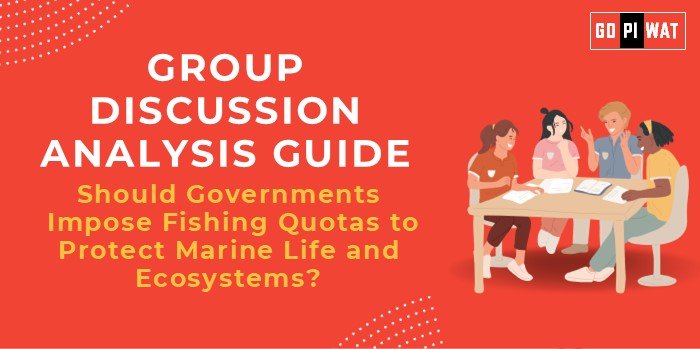📋 Group Discussion (GD) Analysis Guide
Should Governments Impose Fishing Quotas to Protect Marine Life and Ecosystems?
🌐 Introduction to the Topic
- 🌊 Opening Context: “With over 34% of the world’s fish stocks being overfished, marine biodiversity faces critical threats that jeopardize global food security and ecosystem balance.”
- 📖 Topic Background: Fishing quotas, often implemented as a regulatory mechanism, limit the quantity of fish that can be caught to ensure sustainable use of marine resources. Countries like Iceland and New Zealand have employed these strategies to great effect. However, challenges like illegal fishing and enforcement remain globally.
📊 Quick Facts and Key Statistics
- 📉 Global Fish Stock Decline: 34% of fish stocks are overfished (FAO, 2023) – highlights unsustainable fishing practices.
- 💰 Economic Dependence: Fisheries contribute $406 billion to global GDP annually (World Bank, 2023) – critical for livelihoods.
- 🦈 Marine Biodiversity Loss: 70% reduction in shark and ray populations since 1970 (IUCN, 2023) – indicates ecosystem strain.
- 🌟 Quota Success Stories: Iceland: Sustainable cod population restoration through quotas – a global model for fishery management.
🌍 Stakeholders and Their Roles
- 🏛️ Governments: Establish and enforce quotas, allocate resources for monitoring and penalties.
- 👥 Fishing Communities: Directly impacted by quotas, requiring support through alternative livelihoods.
- 🌱 Environmental Organizations: Advocate for sustainable practices and provide research data.
- 🛍️ Consumers: Influence demand for sustainably sourced fish products.
- 🌐 International Bodies (e.g., FAO): Offer guidelines and frameworks for global cooperation.
🏆 Achievements and Challenges
Achievements:
- 🗳️ Iceland’s Cod Recovery: Cod stocks increased by 50% over two decades through strict quotas.
- 🌊 Australian Great Barrier Reef Management: Fishery quotas have helped protect reef-dependent species.
- 🇪🇺 European Union Common Fisheries Policy: Reduced overfishing by 20% since 2014.
Challenges:
- ⚠️ Illegal Fishing: Accounts for 20% of global fish catches.
- 💸 Economic Hardship: Quotas can create economic hardship for small-scale fishers without complementary support systems.
- 🏗️ High Enforcement Costs: Especially for countries with vast maritime zones.
🌍 Global Comparisons:
- 🇮🇸 Success: Iceland thrives with quotas.
- 🇮🇩 Challenges: Indonesia struggles with weaker enforcement mechanisms despite adopting quotas.
📖 Case Study: Norway’s Barents Sea fishery management has achieved near-complete compliance and sustainability.
💬 Structured Arguments for Discussion
- ✅ Supporting Stance: “Fishing quotas, if scientifically determined and strictly enforced, are crucial for long-term marine biodiversity.”
- ❌ Opposing Stance: “Quotas may disproportionately affect small-scale fishermen while failing to address illegal fishing.”
- ⚖️ Balanced Perspective: “While quotas are essential, they must be paired with economic support systems and robust enforcement mechanisms.”
🗣️ Effective Discussion Approaches
Opening Approaches:
- 📊 “Overfishing has depleted 34% of global fish stocks, making quotas an urgent necessity.”
- ❓ “Quotas are a proven solution, but are they fair and enforceable for small economies?”
Counter-Argument Handling:
- 💡 “While quotas may strain small-scale fishermen, targeted subsidies and alternative livelihood programs can mitigate economic impacts.”
- 🛰️ “Enforcement costs can be offset by involving private surveillance technologies like satellite monitoring.”
📊 Strategic Analysis of Strengths and Weaknesses
- 💪 Strengths: Long-term ecosystem recovery, proven international success, biodiversity preservation.
- ❌ Weaknesses: High enforcement costs, potential inequity for small-scale fishermen.
- 🌟 Opportunities: Technology-aided monitoring, eco-labeling for sustainable fisheries.
- ⚠️ Threats: Resistance from local communities, illegal fishing networks.
🎓 Connecting with B-School Applications
- 🌐 Real-World Applications: Can inspire sustainability projects in operations and supply chain management.
- 🎯 Sample Interview Questions:
- “How do fishing quotas align with sustainable development goals?”
- “What role can private companies play in monitoring fishing practices?”
- 📘 Insights for B-School Students: Understanding the economic-environmental balance can enrich consulting or policy-making roles.


